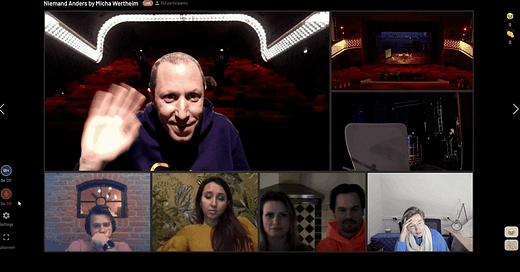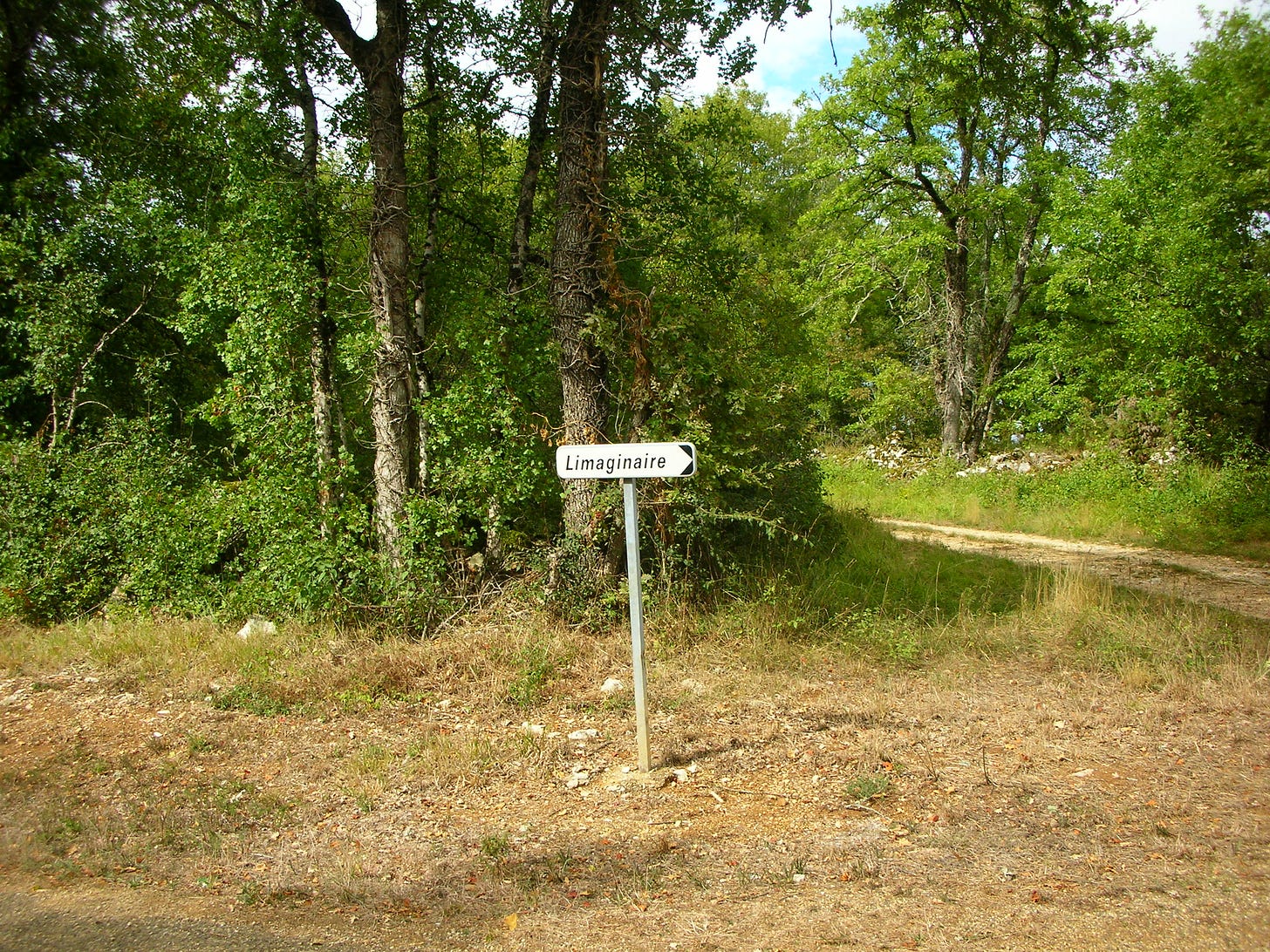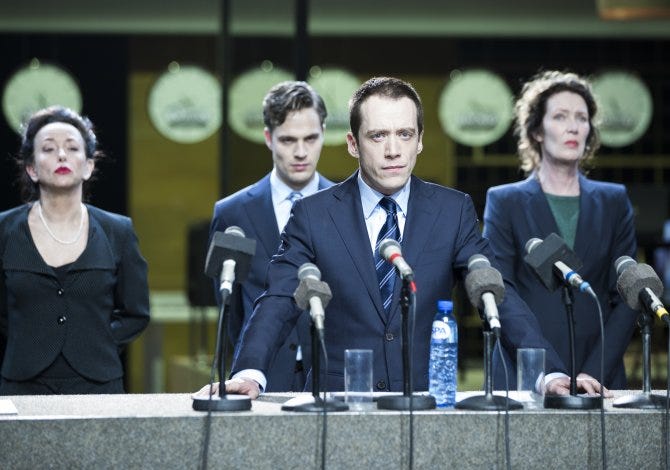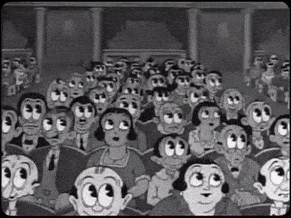Van Dusseldorp's Future of Events (10)
All the world's a stage - online theatre - whilst & at the same time
This is issue 10 of Van Dusseldorp's Future of Events - An exploration of online & hybrid events - what they are and what they will be. You can find all previous issues here.
dear 921 chickens of mine,
This edition is all about the stage. As your personal event explorer, I booked tickets, sat in front of my screen at all hours, and in most cases I contacted the organizers to get a bit of background information as well.
And if this issue seems a bit long (it really is too long), keep in mind I watched a 6-hours-long play especially for you to make it here. What you will find below, is a short observation based on a select number of performances I visited online recently, and some ideas on what we could learn from them.
Bonus: while trying to figure out what is changing & what is new, I cannot help looking back to what once was. It’s my age I guess, it’s the year, it’s the unexpected space that has opened up for me since I started writing this newsletter.
So with spectacles on nose and pouch on side… I have a personal story as well, which I will send along separately. Skip ‘‘Big Bamboozle’’ if you could not care less about early 80s demo tapes!
It’s also the 10th edition (yay) - you can read all 10 issues here if you like.
All my love,
Monique
One more thing - 921 subscribers? Why not a thousand? Well?
Go fetch your event friends and bring them over! Tweet like Andy Budd, Charis, Nurbek or Tim Leberecht for instance! Or write something like Erwin Blom, Jeroen Verkroost, Brendan Brown and Andrea Krajewski did… (❤️❤️❤️❤️❤️❤️❤️❤️!)
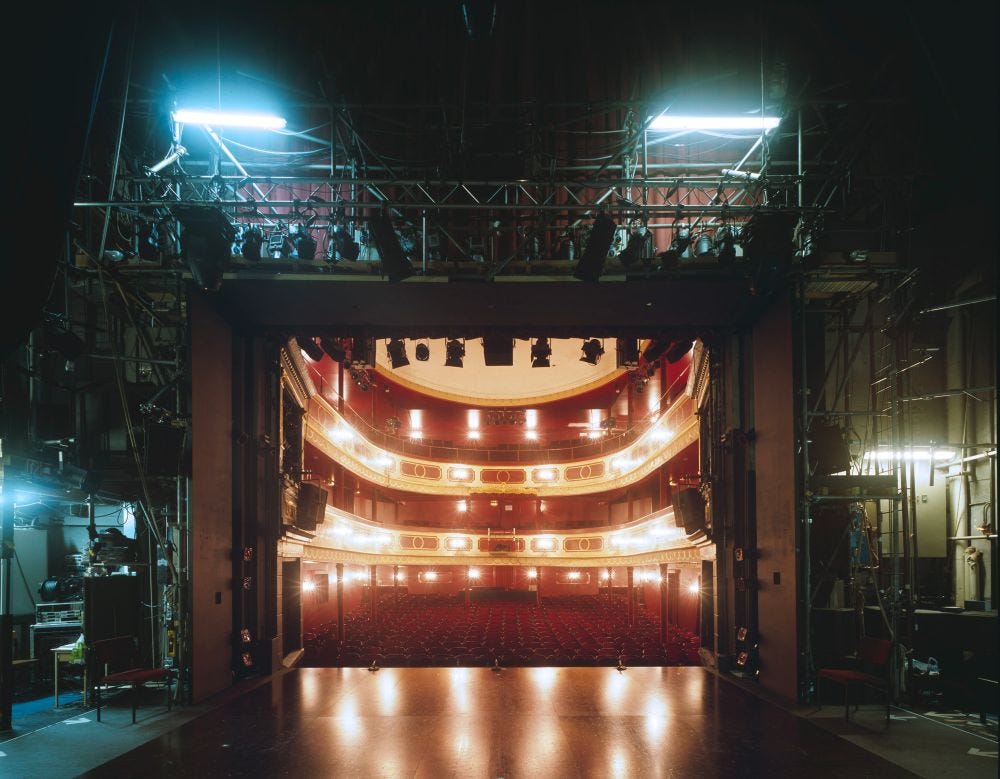
All the world’s a stage
It’s been a year. Let’s put aside all the online conferences for a moment, that whole world of information babble. Let’s just look at performances that are there to touch your soul. What space has opened up for the performing arts this year?
Quick take: the world of online performances can sometimes outperform the real one, or let’s just say, bring you a new and different experience, as you can be closer to the performance and the performers than ever before.
But, but….Yes, you do miss the venue, being part of the audience, the social intermingling afterward, and so much more. We all do. We miss big parts of our lives.
The bare essence is there though: you and the act.
If you look at online events, not through the lens of ‘’I wish I was in a theatre/club together with my friends’’ but see them from the point of I long for connection to a work of art: it’s there.

The events I visited range from a straight-forward live-stream to a Zoom call about presence to a motion-capture experience in a digital forest. What they all shared is ‘‘liveness’’. It all happens whilst & at the same time..
There is something thrilling about knowing the people you watch are actually on the stage at that very moment. It matters - a unity of time across screens.
And audiences do turn up! I mostly found this out by calling the different organizers - there is a growing, dedicated, ticket-buying audience out there. Is this perhaps just a lockdown audience? Will they still buy online tickets when venues open up again?
I think they will. We are witnessing the birth of a new space, and this is just a glimpse of what is to come. It's not perfect, it’s new, and everyone is still searching. Slowly, then suddenly.
Let’s have a look at three examples: ITALive with Romeinse tragedies, Micha Wertheim with ‘‘Niemand Anders’’, and the Royal Shakespeare Company with Dream. Plus a few tidbits from other shows.

ITA Live: Roman Tragedies
As I already mentioned in an earlier newsletter, International Theatre Amsterdam has launched ITALive: live performances of plays from the repertoire shared online, subtitled in English and French.
I bought a ticket (Euro 12,50) for Romeinse tragedies, a 6-hour Shakespeare marathon. Yes, you read that right, 6 hours on a Sunday afternoon! I missed the death of Caesar when I had to walk the dog, and quite a few other scenes for other reasons.
I had not seen the original play nor do I know a lot of Shakespeare. I can nevertheless say it was truly a fantastic experience. And this feeling was shared widely. "Six hours have rarely passed so quickly, or been so smart", wrote the New York Times. Or as the Dutch newspaper, NRC said: it’s as if ITA has created a new lifeline for theatre everywhere.

What was so special? The play combines three Shakespeare classics – Coriolanus, Julius Caesar, and Antonius & Cleopatra – in a modern setting with monitors, screens, TV studios, and more. As such the play had already transformed these stories into our mediated times.
During the original performance, the audience could wander the halls of the venue, where screens were set up to keep following the show. In the case of the live stream, the viewers at home could see everything that was happening: the camera crew following the actors, all the screens, the crew, actors during their breaks, and lots more. So there was more than the play, it was also how the play was filmed, and shared, and how we were watching.
The live stream was full of layers of information, cultural references, a lot to see on all the screens. And not just that, you could see so much more than you could in any venue - a piece of chewing gum changing mouths, the faces of the actors with every emotion in extreme detail, or a sudden move of camera viewpoint: the recently dead were seen from above for instance.

Short updates on the state of things were read out by a well-known Dutch news anchor, there was a clock counting down the minutes to moments like Caesar’s death, and there is a scene in which an actor actually leaves the theatre, walking onto the still snow-covered Leidseplein, where surprised bystanders start filming him. Extreme liveness.


Furthermore, there was a ticker-tape with the news - Roman news, but also breaking news of the day of the performance, combined with tweets by people viewing the show. (Why do we not have a ticker-tape with tweets at all online events?).
All of these elements made you aware that all this was happening right now. Somehow it felt as if we were in the same space because of that.
As I learned from ITA Director Margreet Wieringa, there were almost 8.000 viewers for this show, with around a third joining from outside the Netherlands. In China alone, around 700 people joined a Wechat group and watched together.
ITA had been planning live-streamed performances to cinemas (like the New York Metropolitan Opera and the London National Theatre have done for years). In the meantime, they have also put on dedicated live performances for audiences in Taipei and Adelaide. And as confirmed in the press, ITALive is already considering new ideas for its new online stage.
I would say that ITALive did indeed offer something new - a new kind of theatrical experience.
New York Times: A Roman Tragedies for the History Books.
Volkskrant (in Dutch), Nieuw internationaal publiek, nieuwe mogelijkheden: de theaterstreams smaken naar méér
NRC (in Dutch) Ik zoek de spanning van de live ervaring
ITA Live - background info and tickets, right now for dance performance Triptych (April 3)
Micha Wertheim: ‘Niemand anders’
Micha Wertheim is a Dutch Comedian and podcast host (Echt Gebeurd) who in his shows also plays with the rules of the genre. (He once made a show called ‘‘Somewhere else’’, in which he surprised his audience by not being in the theatre during the entire show - the audience just got instructions on what to do.)
His online show Niemand anders (‘Noone else’) similarly explored the rules and expectations around online performances. Let’s just say: at the end of this show you realize that nothing is what it seemed at the beginning! All those people in the Zoom call that watch the show together with you? Hmm! And that guy that could not get his sound to work, in his conversation with you? Aha! Noone else.
Let’s look at the business side of things. Tickets for this show were €15 (watch together: €22,50), and his show was ‘‘on tour’’ - coming from a different theatre every evening. One lesson: the audience loves buying tickets for their theatre. And two: the courtesy system works. If you ask people to pay a bit more if they do not watch alone, they will actually pay a bit more.
Tom Roetgering of GUTS Tickets confirmed that this is the case for lots of online performances. As Wertheim’s agent Bunker Theaterzaken reported, for the opening night - from Rotterdam - 715 people bought 951 tickets - but for the show from Amsterdam, 2185 people bought 2912 tickets (so almost 3.000 tickets for a venue with 500 seats). And funnily enough, later on, there also was an ‘‘extra’’ show, from a really big Amsterdam venue called Carré :-).
Lesson: no matter how virtual we are, we are connected to certain places and locations, and our connection to them is worth something. Even an online performance is somewhere.
De Volkskrant (in Dutch), De onlinevoorstelling ‘Niemand anders’ van Micha Wertheim was volgens velen een totale mindfuck.
De Correspondent (in Dutch). Wat ik mis nu de zalen leeg zijn: de kans om verkeerd begrepen te worden
Royal Shakespeare Company - Dream
Another Shakespeare performance! I also visited Dream, a live performance set in a virtual midsummer forest, developed by the Royal Shakespeare Society in cooperation with Marshmallow Laser Feast. This was a short virtual play performed by seven actors in motion capture suits and animated in real-time. You could see it for free, or buy a £10 ticket to take part and directly influence the world of the actors (which I did).
Under the shadow of gathering clouds at dusk, lit by the glimmer of fireflies, Puck acts as the guide. You’re invited to explore the forest from the canopy of the trees to the roots, meet the sprites, Cobweb, Mustardseed, Peaseblossom and Moth, and take an extraordinary journey into the eye of a cataclysmic storm.

I loved the experiment and the behind-the-scenes footage perhaps even more than the experience itself - which feels too much like watching an animation. But this IS exactly the kind of experiment you’d want right now and as the RSC writes:
The performances of Dream use motion capture as the culmination of a major piece of cutting-edge research and development (R&D) to explore how audiences could experience live performance in the future in addition to a regular visit to a performance venue.
Royal Shakespeare Company: How will audiences experience live performance in the future? and Live performance and gaming technology come together to explore the future for audiences and live theatre
The Guardian: The RSC's hi-tech Dream opens up a world of theatrical possibility

Some other tidbits worth mentioning
On March 13, the 2010 play White Rabbit Red Rabbit (by Iranian theater maker Nassim Soleimanpour) was performed in over 30 countries to commemorate one year of closed theatres, as initiated by Aurora Nova in Berlin. In this case, the special thing was that the actors had no idea of the script: they got a sealed envelope with the monologue right there and then. I checked out Pierre Bokma in Amstelveen (6371 people watching) - here the fact that the actor does not know what is coming also provided ‘‘liveness’’, and the audience got a role as well. (The ‘‘ask me anything’’ format, for the stage).
The Empty Concertgebouw Sessions are a series of free online concerts live-streamed from the Amsterdam Concertgebouw, one of the top venues in the world of classical music. As Jacob van der Vlugt of the Concertgebouw told me, the most popular show last year was by singer Karsu, whose live performance attracted 500.000 viewers via three platforms: Facebook, YouTube, and especially Instagram. That’s why earlier this year, at the start of the Dutch curfew, the Concertgebouw launched a special daily series on Instagram with live music. The Concertgebouw has just started to sell tickets - not just for live shows, also to get access to the recorded stream.
Dutch rock band Di-Rect has been live streaming concerts every two months for a year now, selling tickets for 2 euros or more. The pay-what-you-want tickets on average now go for 7-9 Euro, but there are people who add 50 or 100 Euro as well. And they sell a lot of tickets! More than 13.000 for their last show, which they did together with the Residentie Orkest.
The Opera Forward Festival, live-streamed from the Dutch National Opera last week attracted 12.000 viewers for a family opera A song for the Moon
I also watched a dance performance, called Shadow's Whispers (€15), by the Netherlands Dans Theater. I loved ‘From England with love’ (1-minute video here), bringing the dancers closer than ever. Joost Poort of NDT told me that up to 9.000 tickets were sold for his evening - he assumes the audience at home to be around 25.000 viewers per performance. NDT has 160.000 followers on Instagram, which helped a lot when promoting the performances.
To wrap it up: bringing live performances to a dispersed audience has long been the realm of television, but now that theatre and music are claiming their space, suddenly we see different formats coming up. More layers, more presence, more experiences.
Shakespeare share of the day: Tuned Chickens
About
Van Dusseldorp’s Future of Events is a newsletter by me, Monique van Dusseldorp. I am a freelance curator and moderator of tech and media conferences (more here). I love to hear from you! Mail me or connect with me on LinkedIn and Twitter. And do tell everyone to sign up for my newsletter! :-)

